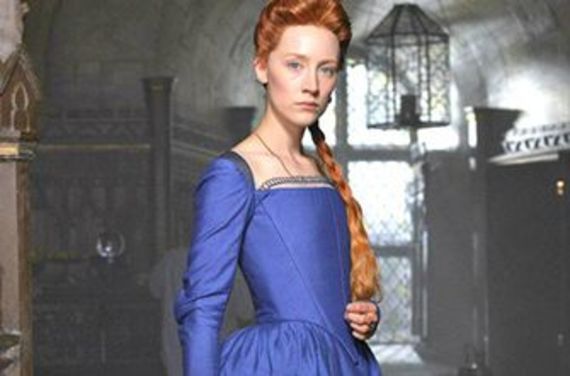Saoirse Ronan is back in the most iconic screen performance of her career, as the Scottish heir to the throne in "Mary Queen of Scots".
When women attempt to rule a man's world, violence often follows. That's the basic arithmetic driving "Mary Queen of Scots."
This sumptuous and totally immersive new dive into the competing reigns of Queen Mary of Scotland and Queen Elizabeth of England in the sixteenth century stars Saoirse Ronan, 24, and Margot Robbie, 28, and it sets up the basic challenge facing both women quickly, that only one of them will be permitted to rule over the world of men.
Queen Mary, played by Ronan, may still be very young in years but the film shows us she's an acute judge of character with a keen political sense that easily matches her own advisors.
If her rivals at court were hoping for a push over those hopes are immediately dashed as soon as she arrives back from France to claim her inheritance and the Scottish throne.
To the south is Queen Elizabeth, played by Robbie, Mary's more powerful English cousin, a woman who the film tells us keenly understands the sacrifices that Mary has to make in order to hold on to her own throne, and who deeply admires Mary's courage and leadership, having no desire to topple her or engage her in conflict, at least at first.

Mary's an entirely new kind of character for Ronan to play onscreen, a woman who literally has the fate of two nations at her fingertips, with all the unforeseen complications and conflicts that suggests. From Ronan's first scene we know exactly where her story is going through, so how we get there and what we learn on the way are the film's main surprises.
Last year Ronan and Robbie were at the top of the film charts and the awards ceremonies together for their impressive turns in "Lady Bird" and "I, Tonya". The pair eventually met at a party that actress Laura Dern threw for all the Oscar nominees and they hit it off immediately, exchanging embarrassing personal stories and bonding over them.
I'm happy to report that bond has carried itself over into Mary Queen of Scots, because when the pair finally meets its an onscreen throw down of epic proportions. But first, they have to navigate the increasingly dangerous world of men.
In England, Elizabeth's council simply will not stand for the sight of two female rulers. In fact, it soon becomes apparent that their larger ambition is to have Elizabeth bring England, Scotland, and Ireland under her exclusive control.
In Scotland, Mary gets wise of their larger ambitions and so much of the film involves how she calibrates her response to it. At all times though there is growing awareness that she's as under siege from her own court as she is from England and Elizabeth.
Why people ever decide to play the fatal game of thrones is one of the biggest questions you will ask yourself as you watch the endless dance of betrayals, setbacks and murders.

Saoirse Ronan stars in Mary Queen of Scots
What tips us off that Mary Queen of Scots has a distinctly feminist sensibility animating it is what happens to the people in Mary and Elizabeth's immediate orbit. Favorites are bitterly and jealously resented, lower status husbands are treated like serfs, the only constant in each woman's life is the threat of complete ruination.
Ronan takes her screen acting to the next level in the new role, finding a vehicle that deeply challenges her as an actress and still managing to effortlessly turn in another Oscar-caliber performance, the finest one of her career to date.
Ronan is radiant onscreen as Queen Mary, achieving a poise and hauteur that brings her character to life in every scene. But this script also takes her to new territory as a romantic lead, and some of makes for uncomfortable viewing, which suggests just how wide her range actually is.

But it's Mary's husband Lord Darnley, played by Jack Lowden, 28, who really tips us off as to where the film is heading. A nobleman and a Catholic in increasingly Catholic averse Scotland, he's a symbol of exactly the kind of religious stability that the inner court no longer wants to maintain.
Darnley's father the Earl of Lennox, played by Downton Abbey's Brendan Coyle, 56, has his own ambitions that conflict with the queens and all of that soon comes to a head, as plot and counterplot are hatched and foiled with a growing body count.
When Lord Darnley's orientation become more widely known (he's what we call in the modern parlance gay) he becomes a target of the all-male Scottish court too, being yet another presumably socially inferior person they simply will not permit to prosper or rule over them.

Margot Robbie and Saoirse Ronan star in Mary Queen of Scots
Modern audiences can see where all this is heading pretty quickly. “How cruel is the world of men,” says Elizabeth near the film's end and no one knows it more than she does. By this time she has become more of an icon than a woman, trapped in a role that permits her no peace and no security and that makes every human connection a potential trap that could end her life.
Ronan's character Mary fares better. She marries, gives birth, maintains her rule and most of her dignity, which considering the odds stacked against her, are major victories in themselves. But we never lose sight of what surrounds her, the envy, spite, and malice that considers her, a mere woman, a lesser being.
By placing this conflict, between patriarchs and the people they want to subjugate out in the open Mary Queen of Scots emerges as a feminist triumph. Mary and Elizabeth may be absolute rulers, the film shows us, but that doesn't mean they are pulling all the strings or directing the action.Most tragically of all, as she achieves more and more power, Elizabeth loses more and more of her true self.
Is the tradeoff worth it if this is the bargain being struck, Mary Queen of Scots asks us? Gaining the world she loses herself, a trade off that Ronan's Mary refuses to ever make.
Mary Queen of Scots opens December 7.




Comments